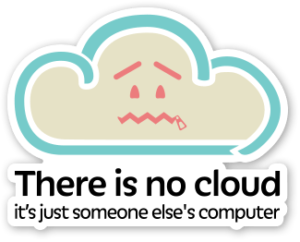Migrating Your Business to the Cloud

What is a cloud infrastructure?
Let’s start by getting a basic understanding of what the cloud is and how it works. “The cloud” has become such a buzz term in recent years that, in some cases, the concept has largely lost its meaning; in fact, you may have seen this snarky little graphic floating around the web already:

Over-simplified to be sure, but still a good point to keep in mind. Like the Internet itself, “the cloud” isn’t a product or a location, but an infrastructure. When we use “cloud storage” or “cloud computing”, we’re using resources that are owned and managed by cloud service providers like Amazon, Microsoft, or Google. Those providers manage datacenters filled with powerful servers and storage drives, spread across the globe. They lease pieces of this infrastructure to individuals and organizations, sometimes for a monthly fee, sometimes for free (read: in exchange for your personal information, which they then sell to advertisers and other organizations. A rule of thumb on the Internet: when you’re not paying for something, you are the product). For example, when you store your files on Dropbox, they’re not floating around in cyberspace, passing airplanes and satellites on their morning commute – they’re just living on one or more of Dropbox’s servers, in a datacenter who-knows-where.
Should I migrate to a cloud-based infrastructure?
A lot of people in IT are very… energetic when it comes to utilizing cloud services. And to be honest, I don’t blame them – too much. There are a ton of benefits to moving your IT systems to the cloud, many of which we’ll talk about here. But it’s not for everyone; like any business decision, several factors must be considered, and a sound business case should be made for a cloud infrastructure before taking the leap. To that end, let’s talk about some pros and cons:
Pros
Reliability
While this depends somewhat on the provider, cloud infrastructure is – for the most part – very reliable. Most cloud services providers are large tech companies (Microsoft’s Azure, Google’s GCP, Amazon’s AWS, etc.) with robust systems at their disposal. Many of their services (especially the paid ones) come with uptime guarantees. Their systems are co-located and redundant, meaning that if one set of hardware on which your data lies should fail – say, a datacenter’s cooling system breaks down – you probably won’t notice, as another set of hardware automatically steps in and starts delivering those services.
Accessibility
Tied in with reliability is accessibility. Since your data is stored on a powerful array of equipment, likely located in more than one place at a time, you’re generally able to access it from anywhere in the world – if you have an Internet connection. This often means more productivity and flexibility for your staff and customers. Being tied to a desk is increasingly a competitive disadvantage in today’s market.
Security
Again, since we’re using services provided by some of the largest tech companies in the world, we can sleep soundly at night knowing that our systems are properly secured. Providers generally keep their systems up-to-date, patch for any known vulnerabilities quickly, and abide by strict physical security protocols. In cloud-based systems, end-users are often the primary (sometimes, effectively the only) vector for mischief.
Flexibility
Most cloud services are built for scalability. Need more storage? Just click a button and you’re on a higher-tier plan for an incremental increase in price, often spread out monthly. Your needs have decreased recently? Again, a lower-tier plan is only a mouse-click away. You can adjust the performance – and cost – of your IT systems very easily, usually with no up-front cost. On-premise systems can be costly to purchase and set up, and inflexible once in place.
Cons:
Reliance on Internet
If you’re in the US, I don’t need to tell you about the joys (read: horrors) of dealing with Internet Service Providers. You likely already have an Internet connection wherever you go, but whether it’s reliable or fast enough to be an effective route to your cloud systems is another matter. Often, you don’t have much in the way of choice regarding your ISP, so the quality of your Internet connection is a major factor in choosing between cloud and on-premise infrastructure.
Cost
Depending on your usage, the monthly cost of cloud storage and/or cloud computing can be prohibitive. For example, I’ve worked with media companies who manipulate and store super-high-quality images and HD video; those companies kept their media files on-premise, since storing them in the cloud would cost thousands each month. Similarly, some engineering firms with whom I’ve worked have elected to build computing arrays on-premise: running their complex equations and simulations on cloud-computing clusters simply costs too much.
Regulatory issues
The widespread nature of cloud providers’ systems can be a roadblock for some companies with regulatory considerations. For example, some firms in the intellectual property and government contractor space are required to keep all their data within the US – this sometimes isn’t an option or raises costs considerably.
Alright, we’ve got a pretty good understanding of what cloud services are and how they’re used. So, are they a good fit for your business? Well, if you could benefit from low upfront costs, flexible and scalable systems that are accessible from anywhere, and you’re not dealing with a huge amount of data or intensive processing requirements, then the answer is very likely: yes! So, where to begin?
Cloud Services for SMBs
Collaboration and Productivity
Office 365 – 365 is a great choice for small and midsize businesses, and often my first suggestion. You can use a custom email domain (you@yourcompany.com), store files in OneDrive and SharePoint Online, and create very robust security and access policies for your data. With plans like 365 Business Premium, you’ll also get access to the full versions of Microsoft Office desktop applications like Word, Excel, PowerPoint, etc. – installable on several devices. If your company primarily uses Windows computers, this is likely the best fit for you.
G Suite – Google’s G Suite is a solid communications / collaboration platform that’s perfect for users who are already familiar with Gmail and Google’s other offerings. Custom email domains, Google’s suite of productivity apps (like Microsoft Office, but used inside a web browser), and increasingly useful file sharing options make this a good choice for many small businesses. It’s a little cheaper than Office 365 but doesn’t have many of the business-minded bells and whistles for which Microsoft is known.
Cloud Computing
Amazon Web Services – AWS is the industry leader in cloud computing, used by many of the world’s largest organizations. AWS has a service for just about every component you can think of (albeit their names are extremely unintuitive). Their most popular services are EC2, S3, CloudFront, and SES, which offer computing, object storage, CDN, and transactional email respectively, although they have hundreds more. If you’re looking to move an application infrastructure into the cloud – AWS definitely has you covered.
Google Cloud Platform – GCP is a great, affordable cloud computing solution, quickly rising through the ranks and arguably a major contender to AWS. They offer their own version of just about every AWS service, including compute machines, object storage, CDNs, etc as well as some of their own unique services like their powerful Vision API, App Engine, Kubernetes, and AI/ML products.
Azure – Azure is a great cloud option if you’re looking to move your Microsoft services, such as Active Directory, SharePoint, and Dynamics. It’s also also the go-to option for hosting custom .NET application infrastructures. However, if you’re not building within the Microsoft ecosystem, I would recommend sticking with AWS or GCP.
Communication
RingCentral – RingCentral is a leading VoIP / hosted phone system provider. With desktop and mobile apps, plus compatibility with almost every VoIP desk phone, RC’s phone system allows for unified communications pretty much anywhere. You can send and receive SMS messages and faxes from your company phone number, set up complex hunt groups and call queues with ease, and get detailed reports on activity, all from a web browser. Simply plug your desk phone into an Internet connection anywhere, and it’s like you’re sitting in your office. Similar providers include Vonage and many ISPs such as Comcast and AT&T.
There are many more types of cloud services and great offerings for each, but we’ll keep this list to the basics – good starting points for your office’s move to the cloud. If you’ve got needs that aren’t addressed by the above services, leave a comment or drop us a line at info@propelit.io – we’ll be happy to expound.
Feeling Cloudy Yet?
I hope we’ve cleared up some misconceptions and answered a few of your questions about cloud-based infrastructure. We’ve embraced the cloud at Propel since day one and have never looked back. We’re able to work from anywhere with an Internet connection, communicate with clients and coworkers with ease, and we’re never worried about losing data to a breach or disaster. If you’re interested in migrating your business to the cloud, or have questions that weren’t answered above, please leave a comment or reach out: info@propelit.io / 720-310-7620. We’re here 24/7, and happy to chat about all of this tech. We are geeks, after all!
Sign up for the Propel Technology Blog newsletter
